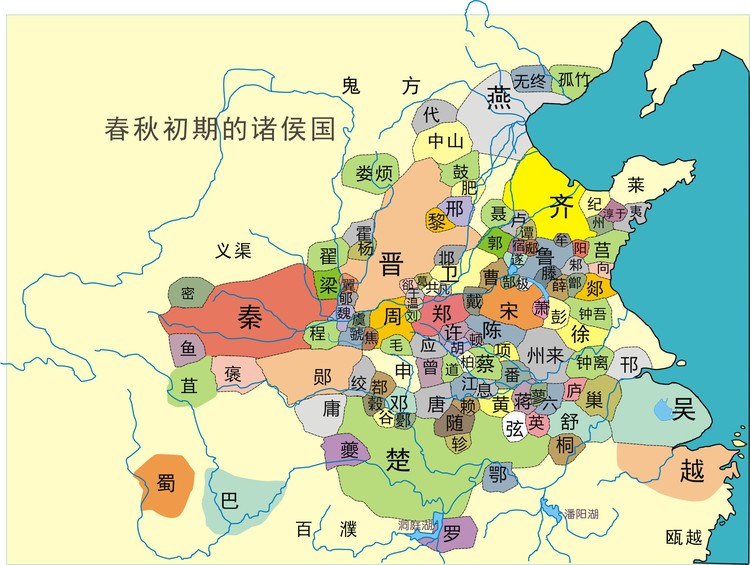(单词翻译:单击)
The Spring and Autumn Period and the Warring States Period
春秋战国时期
Spring and Autumn Period
春秋时期
Marked by overlord politics, this period was named after the book Spring and Autumn Annals (the history of Lu) adapted by Confucius.
春秋,这一群雄争霸的时期,得名与孔子所编撰的一部鲁国史书《春秋》。
After the eastward move of King Ping, some vassal states progressed in social economy.
周平王东迁后,一些诸侯国社会经济迅速发展。
They became stronger while the royal authority took a nose dive, gradually losing its control over them.
它们日益强盛,而王权则一落千丈,逐渐失去对诸侯们的控制权。
During the Spring and Autumn Period, there were over 150 kingdoms coexisting with Zhou, among them Qi, Lu, Jin, Yan, Qin, Chu, Wu, Yue, etc were the stronger.
在春秋战国时期,有超过150个诸侯国与周共存,其中齐,鲁,晋,燕,秦,楚,吴,越等国较为强大。
These powerful states, relying on their military and economic advantages, launched wars to expand their territories; forcing small states follow them so as to establish their dominance as overlords.
这些强大的国家,依靠自己的军事和经济优势,发动战争以扩大自己的疆土;迫使小国成为它们的附属,从而建立自己的统治地位的霸权。
In the early to middle stage of the Spring and Autumn Period, five dukes, namely Huangong of the Qi state, Xianggong of the Song, Wengong of the Jin, Mugong of the Qin and Zhuangwang of the Chu, once fought for the “ overlordship”,known as the “the Five Overlords of the Spring and Autumn Period”,in which Huangong of Qi was the first one to establish his hegemony by advocating respect the king and repulse the alien tribes. ”
春秋前期至中期,五位诸侯,即齐恒公、宋襄公、晋文公、秦穆公、楚庄王,都曾为了“霸主地位”而发起过战争,被称为“春秋五霸”,其中齐桓公首先提出“尊王攘夷”的口号以建立自己的霸权。
Continuous wars brought enormous balefulness to the people giving rise to wide opposition in the small states.
连年的战争给人民带来巨大的灾难,小诸侯国内开始出现大范围的反抗。
Finally, in 579 BC and 546 BC, two treaties were made between Jin and Chu kingdoms, resulting in a short peace in the Central Plains.
最终,在公元前579年至公元前546年,秦国和楚国缔结条约,为中原地区带来了短暂的和平。
In the epilogue to the struggle to become overlord of the Central Plains, Wu and Yue, two kingdoms located in the downstream area of the Yangtze River, rose up.
当中国诸侯争霸战争进入尾声之时,地处长江下游的两个国家吴国和越国发展壮大起来。
Firstly defeated by the kingdom of Wu, Goujian, the king of Yue, applied himself to the development of agriculture and training his army.
被吴国打败之后,越王勾践卧薪尝胆,潜心发展农业,训练军队。
He finally got an opportunity to conquer the Wu and became the last overlord during the Spring and Autumn Period.
最后,他抓住机会消灭吴国,成为在春秋时期的最后一个霸主。
According to historical records, during this period, a total of thirty-six kings were killed and fifty-two vassal states were demolished.
据史料记载,在此期间,共有36国王被杀,52诸侯国被消灭。
This constant conflict and annexation of one state by another during the Spring and Autumn Period hastened social and economic change and had the effect of integrating people of different tribes and nationalities.
春秋时期这种国与国之间不断的冲突和吞并加剧了社会及经济的变化,并对来自不同部落和国家的人们产生了深远的影响。
The consequence of this period of drastic upheavals, reshufflings and regroupings, what had been several hundred states were reconstituted into seven megastates.
经历了这一时期的剧烈动荡、兼并、重组,数百个诸侯国最终被七大国(齐、楚、燕、韩、赵、魏、秦)吸收兼并。
China entered the Warring States Period.
自此,中国进入战国时期。


